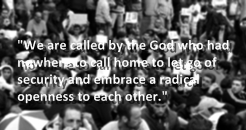 A Church for the poor? Letting go of power
A Church for the poor? Letting go of power
Republished from Church Action on Poverty Liam Purcell 29.4.16
Inspired by Pope Francis’ vision of “a poor church, for the poor”, Church Action on Poverty is exploring how churches can do more to stand in solidarity with people in poverty.
Reflections of many prominent Christians will shortly be published as a collection but here is a reflection by Clare McBeath, Co-Principal of the Northern Baptist College. She has been a minister in an inner city church, and worked for Church Action on Poverty.
A few weeks ago we took a risk. We took a risk in suspending the regular teaching programme at Luther King House (Manchester) for a week. Instead, we gathered the whole community to reflect theologically on a theme, a theme we hear almost daily on our radios and TVs: that of migration.
But we didn’t want to just reflect on the stories of migrants ‘out there’, in Calais, Greece or Turkey. We recognized that a large proportion of our students are themselves migrants with stories to share, and from whom we could learn. So we began by giving everyone their travel permit and lining up according to how far we had travelled on holiday or for work. We learned that many of us travel almost without thinking about it, and I, for one, take for granted that I can travel anywhere in the world.
We listened to each other’s stories – stories from Rwanda, the Democratic Republic of Congo, Zimbabwe, South Africa, Eritrea… We heard stories of horror, of violence, extreme poverty and rejection, and stories of hope, of hospitality, welcome and celebration. Together we learned some of the statistics behind the news headlines, and challenged ourselves to unmask the negative language of the media .
Together, we learned stories of migration going back to the very origins of humanity in Africa, migrations within Europe, colonialism and the transatlantic slave trade, the Second World War and the economic migration that followed it. In other words, we learned that migration is normal and has often has a religious dimension.
We looked too at the Bible and its diverse voices and stories of migration, which we can see reflected in current debates.
So where did all this leave us theologically? It left us exploring issues of identity and celebrating diversity. It left us questioning boundaries and challenging the media stories we are fed. It left us with a deep sense of needing to confess that many of us have benefited from being citizens of a colonial power, and wanting to seek reconciliation.
It helped us to see that the church is migrating as well as hosting. That God, Jesus and the Holy Spirit offer hospitality, but are also the migrant on the move.
In short, it helped us get beyond the ‘them and us’. To move to a place where we are all in some sense leaving home to embark on a journey. To offer hospitality, to call for jubilee and mutual interdependence, to embrace change and movement with a child-like playfulness. In short, to recognise that we need a new vision where all are migrants in solidarity with one another.
So why is this a call to action? How does this embody a vision of a church for the poor? Because these distinctions of them and us, rich and poor, host and migrant, the Western world and the global South, are breaking down, and we are called to cross these boundaries. We are called by the God who had nowhere to call home to let go of security and embrace a radical openness to each other. We are called by the crucified God to let go of power and embrace vulnerability. We are called by the resurrected God to let go of fear and live out a radical love, a new community, God’s kin-dom here on earth.
And it starts with us, each one of us.
Retweet about this article:
Liam Purcell, 10/05/2016